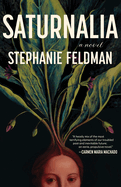
| Publisher: | Unnamed Press | |
| Genre: | Urban, Occult & Supernatural, Horror, Magical Realism, Fantasy, General, Literary, Crime & Mystery, Fiction, Science Fiction | |
| ISBN: | 9781951213640 | |
| Pub Date: | October 2022 | |
| Price: | $28 |
| Starred | Fiction |
by Stephanie Feldman
A woman risks courting the anger of a powerful organization and discovers a shocking secret in Saturnalia, the fast-paced, near-future thriller from Stephanie Feldman (The Angel of Losses). The world teeters on the brink of ecological collapse. Mutual-aid organizations have morphed into the centers of social power. Nina cut her ties with the Saturn Club, consisting of Philadelphia's elite, three years ago and has scraped by since then, making a living with her tarot deck: "It's not the life I planned for, telling fortunes during the end of days," the novel opens, "but clients are plentiful." Just before the Saturnalia festival, which has become a wild, annual masquerade, Nina hears from a friend with influence in the club, who asks her to run an errand. Retrieving an item from the Saturn Club, she discovers that these secret societies have dabbled in forces beyond anything she had imagined, and one of them now hunts her.
In an action-packed and relatively brief narrative, Saturnalia expertly and vividly portrays a world both recognizable and alien. After she returns to the club, Nina is propelled from one revelation to the next. Readers learn the painful history that led her to cut ties with the shadowy organization she has abandoned, a club that could have been her ticket to success. She must confront her past, escape with her life and decide what else is worth protecting--and at what cost. Should Feldman want to revisit this world in subsequent novels, readers will be happy to return. --Kristen Allen-Vogel, information services librarian at Dayton Metro Library
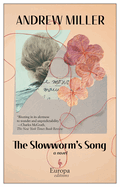
| Publisher: | Europa Editions | |
| Genre: | World Literature, Ireland - 20th Century, War & Military, Epistolary, General, Literary, Fiction, Historical | |
| ISBN: | 9781609458003 | |
| Pub Date: | October 2022 | |
| Price: | $18 |
| Starred | Fiction |
by Andrew Miller
It's hard to outrun one's past, as Stephen Rose discovers in The Slowworm's Song, the traumatic yet beautiful ninth novel by Andrew Miller (The Crossing). Rose, a 51-year-old with a lifelong drinking problem, has managed to put out of mind a life-altering event from his time in the British military 30 years earlier and has since lived a quiet life in Bristol, where he works at a shop called Plant World and spends time at a Quaker meeting house. Then he receives a letter from something called the Commission. They want him to travel to Belfast, where he was stationed during the Troubles, so that they can interview him about his involvement in a deadly 1982 incident.
The novel is a long essay Rose writes to Maggie, the adult daughter he barely knows, "to get in my side of the story before they got in theirs." In Miller's characteristically elegant prose, he takes readers through the salient events of Rose's life: his relations with former partner Evie (Maggie's mother); his upbringing with a Quaker father; and the odd jobs and checkered events, including a conviction for drug dealing, that led him to a Royal Air Force base near the Irish border, ready to fight the Irish Republican Army. The result is a moving work about the need to atone for past wrongs, the value of second chances for those lucky enough to attempt them and the possibility of finding kindness in the unlikeliest sources. --Michael Magras, freelance book reviewer
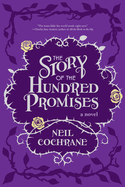
| Publisher: | Forest Avenue Press | |
| Genre: | Fairy Tales, Folk Tales, Legends & Mythology, Fantasy, Transgender, Fiction, Historical, LGBTQ+ | |
| ISBN: | 9781942436515 | |
| Pub Date: | October 2022 | |
| Price: | $18 |
| Fiction |
by Neil Cochrane
Trans author Neil Cochrane's The Story of the Hundred Promises is a layered, sometimes cheeky and always enchanting queer fantasy with a big heart. This loose retelling of "Beauty and the Beast" features Darragh, a trans sailor with strained family relationships and a strong sense of self, who embarks upon an epic quest to save the beast character. Merrigan, more of a wicked enchanter than a beast, is a complicated, fully realized nonbinary weaver of magic that can heal or harm. Merrigan's magic, much like Merrigan emself, is not one thing or the other; instead, it's both and neither. Cochrane seamlessly weaves folktales--ones that center such agender or nonbinary pronouns as "em"--into the narrative such that the novel almost appears to be written from two points of view.
Cochrane (From Under the Mountain, writing as C.M. Spivey) builds queerness into the very bones of this story, evident from Merrigan's use of Spivak pronouns (e/em/eir) and a naming convention in which characters introduce themselves with their first name, pronoun and the name of their elder parent. Cochrane makes clear that the names people call themselves are important, but his brand of "queer optimism" focuses on the intentional formation of community and family in the face of what is often generational trauma.
Though he throws many obstacles in their paths, the author treats his characters with the care everyone deserves and leads them to hard-won endings that are satisfying on their own terms. The Story of the Hundred Promises is a joyfully queer adventure for the world-weary. --Suzanne Krohn, librarian and freelance reviewer
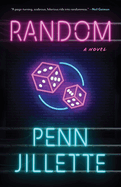
| Publisher: | Akashic | |
| Genre: | Humorous, Black Humor, Crime, Literary, Coming of Age, Fiction | |
| ISBN: | 9781636140711 | |
| Pub Date: | October 2022 | |
| Price: | $27.95 |
| Fiction |
by Penn Jillette
When his father, a gambling addict, racks up more than $2.5 million in debt to murderous loan sharks, Bobby bets the lives of his family on a dice roll in Penn Jillette's Random, a darkly comedic thriller of happenstance. Twenty-year-old Bobby Ingersoll loves his job driving an advertising truck along the Las Vegas Strip. His complacency comes to a screeching halt when he learns his father owes a tremendous debt to Fraser Ruphart, an evil loan shark. If someone doesn't pay Ruphart, Bobby will die--and so will his sister and mother.
Bobby begs, borrows and steals to get the cash, but he's nowhere near the amount needed when the loan comes due. Distraught, Bobby wanders into a notoriously dangerous neighborhood and into the middle of a gangbanger shoot-out. A big bag of money ends up in Bobby's hands. It's still not enough to help his family, but Bobby's inspired. He bets all of it at a casino and the outcome gives him a new life path: the way of Random. Everything Bobby decides from that moment forward will be determined by a dice roll. Bad guys don't take kindly to winners in Vegas unless they get a cut of the action. Bobby's newfound religion creates hellacious, madcap complications but could be the very thing that saves him.
Jillette (God, No!) writes with the same irreverent and bawdy sense of humor he employs in his magician-comedy act with Teller, of Penn and Teller. It might be an acquired taste, but Jillette is an undeniably talented writer and makes Random palatable by wrapping the story in a higher philosophical truth. --Paul Dinh-McCrillis, freelance reviewer
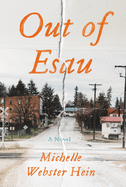
| Publisher: | Counterpoint | |
| Genre: | Small Town & Rural, Family Life, Religious, General, Marriage & Divorce, Fiction | |
| ISBN: | 9781640094123 | |
| Pub Date: | October 2022 | |
| Price: | $27 |
| Fiction |
by Michelle Webster Hein
Out of Esau, Michelle Webster Hein's debut novel, beautifully captures the rewards and burdens of the intimate connections between mothers, fathers and their children. In the small town of Esau, Mich., the innermost desires and fears of human nature are exposed through the intertwined perspectives of the town's pastor and the family members in need of his guidance.
Newcomer Susan Shearer, after her tardy arrival to Pastor Robert's back pew at a Sunday service, changes the trajectory of both of their lives. In the opening chapter, the pastor observes: "As she passed, God help him, he looked for a ring, and, God help him, he found one, a tiny white stone glinting atop a gold band." Their immediate connection forces them to make difficult decisions--for their own and their families' well-being. The novel, which fully submerges readers in both its setting and the innermost thoughts of the characters, dramatizes the small-town experience, touching upon such aspects as gender, faith and family dynamics.
In the midst of battling the increasingly treacherous mental and physical challenges of her marriage, Susan finds Pastor Robert in time to save herself and her children from a downward spiral. The novel celebrates profound human connections, exploring the newly kindled friendship between the two as they navigate impossible expectations as well as loss and the uglier aspects of love. When they realize their connection might be greater than it should be, they must make hard choices about their futures. Heartbreakingly genuine characters distinguish Webster Hein's nuanced portrayal of love and loyalty to one's family. --Clara Newton, freelance reviewer
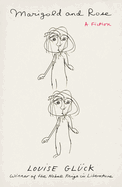
| Publisher: | Farrar, Straus and Giroux | |
| Genre: | Family Life, Fairy Tales, Folk Tales, Legends & Mythology, General, Fiction | |
| ISBN: | 9780374607586 | |
| Pub Date: | October 2022 | |
| Price: | $22 |
| Fiction |
by Louise Glück
With Marigold and Rose, her first foray into fiction, poet Louise Glück (The Wild Iris) gives readers a distinctive look at both innocence and experience through the eyes (and minds) of infant twins during their first year of life.
Glück chooses each word carefully and leaves only the necessary and true on the page, so Marigold and Rose is a decidedly slim volume, but it holds a wealth of insight. The narrative opens with "Marigold was absorbed in her book; she had gotten as far as the V," and progresses in an alternating close third-person, bouncing between the twins and their particular personalities. Though the twins are named, Father and Mother remain abstractions, vital but vague and formless. The children, however, are fully formed: Marigold is quiet and observant, already a writer ("That she couldn't read was an impediment. Nevertheless, the book was forming in her head"); Rose "was a social being," eager to please, quick to smile. Both see the other as central to their emerging story.
This short novel is inspired by the author's grandchildren, born during the lockdowns, which meant Glück observed their first year from a distance, via video. Under those circumstances, it would be easy for Marigold and Rose to slip into sentimentality. Instead, the simplicity of the subject matter serves to elevate each moment of brilliance. The babies are bathed, they sleep in separate cribs, they learn to drink from a cup--all ordinary moments that are somehow transfigured. In this way, the novel becomes a reflection on life, learning, time and always--always--the choosing of just the right words. --Sara Beth West, freelance reviewer and librarian
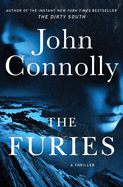
| Publisher: | Emily Bestler/Atria | |
| Genre: | Mystery & Detective, General, Suspense, Thrillers, Fiction | |
| ISBN: | 9781982177003 | |
| Pub Date: | October 2022 | |
| Price: | $28 |
| Mystery & Thriller |
by John Connolly
In The Furies, John Connolly (The Nameless Ones; A Book of Bones) combines two short novels into one fiery thriller that has detective Charlie Parker--from the series of the same name--stepping back to let scorned women take down the bad guys. The first part centers on Raum Buker, an ex-con who commits a coin heist promptly upon his release from prison. He books a room at the Braycott Arms, a seedy motel, to lie low. While there, Raum renews sexual relations with the Sisters Strange, Dolors and Ambar. Dolors tells her ex-boyfriend, Will Quinn, that Raum smells of burning, and Will hires Parker to keep her safe. A sinister paranormal presence has been following Raum, putting both sisters in danger. But the Strange women aren't pushovers and it might be best for Parker to step out of the way.
In the second novel, comprising part two of the book, Sarah Sawyer hires Parker. She's being threatened by lowlifes Lyle Pantuff and Gilman Veale for money her late husband stole. The thugs are holding hostage some of her dead daughter's possessions and demanding money Sarah doesn't have. The blackmailers hide out at the Braycott Arms, where Veale endures sleepless nights hearing a child running up and down the hallway. But the motel has a strict no-kids policy. Who or what is prowling the place at night?
Fans of the Charlie Parker series will be elated at two doses of their favorite supernatural detective in one spectacular volume, complete with macabre humor and spinetingling mystery. --Paul Dinh-McCrillis, freelance reviewer
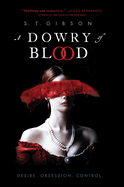
| Publisher: | Redhook | |
| Genre: | Paranormal - Vampires, Fantasy, Romance, Gothic, Paranormal, Fiction, Historical | |
| ISBN: | 9780316501071 | |
| Pub Date: | October 2022 | |
| Price: | $27 |
| Starred | Science Fiction & Fantasy |
by S.T. Gibson
The brides of Dracula come to glorious un-life in A Dowry of Blood, a seductive and visceral novel from S.T. Gibson (Robber Girl) that follows the legendary blood-drinker's concubines as they come into their own. A young peasant lies bleeding and broken after the brutal slaughter of her village until she is visited by a man she calls only "you." He transforms her from dying human to undying vampire, from helpless victim to his death-dealing queen. She leaves her old name and becomes "Constanta, your dark and unbreakable jewel." Although she never identifies him as Dracula, a later reference to a "debacle with the Harkers" removes any possible doubt.
Their honeymoon leaves a trail of bodies across Europe from the days of the Black Plague through the early 1500s. Constanta is furious when he presents her with brilliant, gorgeous Spanish noblewoman Magdalena as a sister-bride. She doesn't stay angry for long: she falls deeply for their newly turned companion. However, her affection for Magdalena forces her to realize that their maker acts more like a jailer than a lover. When their family grows again, Constanta realizes the brides must find a way to free themselves from a violent master who will never let them go.
Gibson's lush, poetic prose brings romance and grace to a tale of violence and obsession. Her polyamorous vampire brides have a group dynamic that flows from unflinching eroticism to familial bonding--and then back again--with deft ease. This dark-fantasy meditation on domestic violence and survival breathes new life into the Dracula mythos. --Jaclyn Fulwood, blogger at Infinite Reads
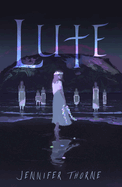
| Publisher: | Tor Nightfire | |
| Genre: | Horror, General, Supernatural, Thrillers, Fiction | |
| ISBN: | 9781250826084 | |
| Pub Date: | October 2022 | |
| Price: | $26.99 |
| Science Fiction & Fantasy |
by Jennifer Thorne
An American expatriate learns her quaint British island home has a dangerous secret in Lute, a foreboding, chilling first novel for adults from YA author Jennifer Thorne (Night Music, writing as Jenn Marie Thorne). Nina, a Floridian, has lived on the British island of Lute with her husband, Lord Hugh Treadway, for seven years in a near future that sees America at war with Europe. She deems whispers about "the Day," the local name for every seventh summer solstice, mere superstitions that the islanders use to explain their fabled luck and prosperity. She is disappointed when Hugh books their family a holiday off the island, but the boat leaves without them. The Day comes, and Nina finds herself living out a horror story as deaths begin to stack up à la Final Destination. She begins to grow into her traditional role as Lady Treadway, feeling "struck by the strange vertigo of not knowing what's spontaneous and what's a tradition lost in translation." The plot drives toward an explosive conclusion, and no one's survival is guaranteed.
Thorne builds an eerie, claustrophobic atmosphere with gothic elements and images lifted from Britain's pagan past. Sacred groves and sacrificial stone altars lie within reach of a mostly empty manor house. Nina's shift from outsider to leader echoes the story's themes of responsibility, community and equilibrium. The Day takes mercilessly, yet there is a savage beauty to its balance of grief and honor. This quiet, brutal alchemy of death and duty will haunt and delight horror and fantasy readers. --Jaclyn Fulwood, blogger at Infinite Reads
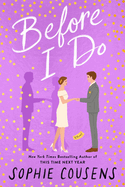
| Publisher: | Putnam | |
| Genre: | Women, Romantic Comedy, Romance, Fiction | |
| ISBN: | 9780593539873 | |
| Pub Date: | October 2022 | |
| Price: | $17 |
| Romance |
by Sophie Cousens
Before I Do, the clever and charming third novel from Sophie Cousens (This Time Next Year; Just Haven't Met You Yet), explores the fears and hopes of a woman on the verge of marriage. Audrey loves Josh and feels like his steadiness balances her wanderlust. But when everything related to their wedding that could go wrong does go wrong--a dead bat falls from the church ceiling, the photographer gets stuck in traffic, her mother seems to be having yet another affair and Josh's grandmother keeps talking about omens--it makes Audrey wonder if the universe is trying to tell her not to get married.
Audrey becomes convinced that she's making a terrible mistake when Fred shows up as an unexpected wedding guest. The so-called one that got away, Fred shared one magical day with her six years earlier. The novel is expertly paced, flashing back and forth from the wedding preparations to Audrey and Fred's incredible day of adventure and Audrey and Josh's slower-paced courtship. It's also a thoughtful look at what truly makes relationships tick and how to handle those lingering "but what if?" feelings. Transcending the typical love-triangle trope, Before I Do is smart, funny and consistently delightful. Audrey's butterflies are familiar, and the series of unfortunate events that befall her, Josh, Fred and the rest of the wedding guests are downright hilarious. Fans of Beth O'Leary or Sophie Kinsella are sure to love Sophie Cousens's work. --Jessica Howard, freelance book reviewer
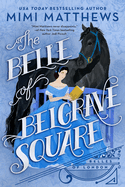
| Publisher: | Berkley | |
| Genre: | Historical - Victorian, Romance, Fiction | |
| ISBN: | 9780593337158 | |
| Pub Date: | October 2022 | |
| Price: | $17 |
| Romance |
by Mimi Matthews
Two people struggling with the roles they must play in society create a haven in The Belle of Belgrave Square, the comforting second entry in the Belles of London series by Mimi Matthews (The Siren of Sussex). Julia Wychwood suffers from oppressive anxiety in London's high society, but she loves riding horses and reading novels: she and her friends are "more comfortable in their sidesaddles than in a ballroom." She nearly faints the first time she is introduced to Captain Jasper Blunt. Unfortunately, her parents expect her to use her dowry to win a husband who will keep her close by so that she can continue to care for them.
Jasper Blunt, although widely hailed as a war hero, is also haunted by rumors of his conduct in the army and the illegitimate children he's hiding at his country estate. He needs a wife with money to pay for the upkeep of the crumbling house in Yorkshire and provide for the children's future. When Julia realizes she must escape her parents and proposes to him, he accepts her condition that he take her away from London and allow her to read and ride all she wants. In exchange, she is forbidden from entering his private study or asking questions about his past.
Julia gradually comes into her own as she settles into country life, bonds with her stepchildren and peels open the mysteries in Jasper's background. If Jasper's secrets are not difficult to guess, the journey to their revelation--resonant of the myth of Eros and Psyche as well as "Beauty and the Beast"--is still emotionally satisfying. --Kristen Allen-Vogel, information services librarian at Dayton Metro Library
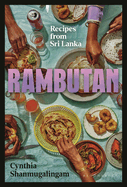
| Publisher: | Bloomsbury | |
| Genre: | Indian & South Asian, Cooking, Regional & Ethnic | |
| ISBN: | 9781526646576 | |
| Pub Date: | October 2022 | |
| Price: | $35 |
| Starred | Food & Wine |
by Cynthia Shanmugalingam
Cynthia Shanmugalingam, a British Sri Lankan Tamil chef known for her eatery pop-ups and street food stalls, which serve a frenzy of happy customers, has taken the London food scene by storm; she is planning to open her first restaurant in London's Borough Market. With her vivacious writing style, enhanced by images of her ancestral homeland and its people, Shanmugalingam's energetic narrative and tasty recipes in Rambutan: Recipes from Sri Lanka offer readers a veritable feast for the senses.
Shanmugalingam was born and raised in Coventry, England, and spent summer vacations visiting extended family across Sri Lanka. In Rambutan, her first cookbook, she celebrates the diaspora dishes of her immigrant family, influenced by their island heritage, adding special twists designed to deliver "as much edible Sri Lankan joy as easily as possible." There are more than 80 recipes: half are vegan, and vegetables play a starring role in many of her creations. She includes instructions for simple, homemade spice mixes and an abundance of red, white and black curry recipes, boldly declaring that curry was in fact invented by the Tamil people. She presents multiple recipes for sambol, a side dish that deliver hits of concentrated flavor; explains the ancient method of tempering spices to ignite their aroma; and spotlights bowl-shaped pancakes known as "hoppers," calling them "the racy underwear of Sri Lankan food."
Rambutan is a cookbook to be savored for its abundance of accessible recipes and celebration of Sri Lanka's joyful food culture. It invites readers to experience the fascinating trajectory of one family's culinary history. --Shahina Piyarali, reviewer
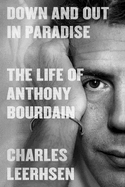
| Publisher: | Simon & Schuster | |
| Genre: | Biography & Autobiography, Culinary, Entertainment & Performing Arts | |
| ISBN: | 9781982140441 | |
| Pub Date: | October 2022 | |
| Price: | $28.99 |
| Biography & Memoir |
by Charles Leerhsen
In Down and Out in Paradise: The Life of Anthony Bourdain, Charles Leerhsen concludes that the celebrity chef wasn't so much a great cook or writer as a great personality and storyteller. Leerhsen seems to channel his subject's exuberant spirit, spiking his pages with Bourdainian swagger and a drizzle of lawlessness, starting with the biography's unsurpassed first sentence: "One day about twelve years before he started to smoke and drink, Anthony Bourdain was born."
Anthony Bourdain (1956-2018) was raised in the New Jersey suburbs by parents whose doomed marriage and foodie ways probably equally influenced him. His very gradual climb up the New York restaurant ladder led Bourdain to distill his decades of experience in Kitchen Confidential: Adventures in the Culinary Underbelly, the 2000 bestseller that made him a literary star. He then became a star of the small screen across a span of 17 years as the gonzo host of various on-the-road food shows.
Leerhsen (Butch Cassidy) taps more than 80 interview subjects and pays particular attention to the women who, crucially, shaped Bourdain's life. As funny as Leerhsen is (one restaurant that Bourdain worked at in the 1980s "closed so abruptly that it's a wonder Liza Minnelli and Halston weren't trapped inside"), he's equally adept at chronicling the dark side of his subject's story. Readers will leave Down and Out in Paradise with the impression that Bourdain took his own life for a reason at odds with his alpha-male persona: he seems to have died of a broken heart. --Nell Beram, author and freelance writer
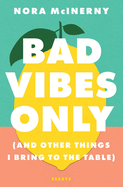
| Publisher: | One Signal/Atria | |
| Genre: | Biography & Autobiography, Women, Form, Personal Memoirs, Humor, Essays | |
| ISBN: | 9781982186715 | |
| Pub Date: | October 2022 | |
| Price: | $27 |
| Biography & Memoir |
by Nora McInerny
Nora McInerny's fifth book, Bad Vibes Only, is a witty, insightful set of essays about self-worth and parenting in the social media era. Those familiar with the author's previous autobiographical works will remember that within a few weeks in 2014, her father and first husband, Aaron, both died of cancer. After several years as a single mother, she married Matthew and they blended their families.
Even when dealing with serious topics like anxiety and narrow escapes, McInerny (Bad Moms) has a consistently light touch. "I have always been the saddest happy person I know (or maybe the happiest sad person I know)," she jests. She likens finding a therapist to online dating, while "Competitive Parenting Association" issues a satirical welcome pack of guidelines. Channeling humorists like Nora Ephron, she writes about her extreme homebody nature, her surprise at learning a college friend became a nun, and recounts taking a recreational drug to get through her 20th high school reunion.
McInerny is endearingly honest, aware of her privilege and open about her contradictions. She refers to herself as "proudly middle-aged," but admits she gets regular facial injections. Addictive behaviors run in the family--her father was an alcoholic and she had an eating disorder in college--and she also acknowledges her addiction to her phone. She links her schoolgirl academic perfectionism to her current zeal for likes and comments on social media.
There may be no nuance on the Internet, but there's plenty in these 19 funny, bittersweet essays. --Rebecca Foster, freelance reviewer, proofreader and blogger at Bookish Beck
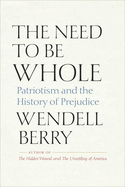
| Publisher: | Shoemaker & Co. | |
| Genre: | Discrimination, Race & Ethnic Relations, American - African American & Black Studies, Social Science, Essays, Ethnic Studies, Political Science | |
| ISBN: | 9798985679809 | |
| Pub Date: | October 2022 | |
| Price: | $24 |
| Social Science |
by Wendell Berry
Wendell Berry (Hannah Coulter; Jayber Crow) is recognized as a good-natured outsider. In Need to Be Whole: Patriotism and the History of Prejudice, Berry steps deliberately into a conversation about race and politics, fully aware of the attendant risk and responsibility. This book unites assertions Berry has worked with for years: the importance of local and loving care of the land; an insistence on neighborliness; and the possibility of justice and repair. Add to these the issue of race, and Berry speaks with unadorned honesty on the things that divide us, asserting, "I mean at least to tell the truth, as I am able to know it, about the difficulty of our problems."
Anticipating and even inviting opposition, Berry hopes for a dialogue where his "side of the conversation has been disagreement, pointed and plain, but expecting a reply equally pointed and plain." The strongest essay is "Work," in which Berry makes a connection between slavery and the subsequent degradation of manual labor that has made the right caretaking of the land nearly impossible, a set of damages that has harmed us all. He argues that "the fate of work and the fate of our country are the same. The wholeness of work is the same as the wholeness of the land and the people." Though lengthy, this book does not ramble; instead, each essay contributes to a cogent argument that will engage those readers genuinely interested in wrestling with impossible questions toward some possible future good. --Sara Beth West, freelance reviewer and librarian
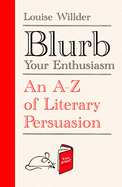
| Publisher: | OneWorld | |
| Genre: | Industries, Nonfiction (Incl. Memoirs), Literary Criticism, Social History, Media & Communications, Language Arts & Disciplines, History, Publishers & Publishing Industry, Humor, Editing & Proofreading, Writing, Business & Economics, General, Books & Reading | |
| ISBN: | 9780861542178 | |
| Pub Date: | October 2022 | |
| Price: | $24.95 |
| Essays & Criticism |
by Louise Willder
Blurbs are "the outside story of books," and there's more to them than most people think. In her first book, the wittily named Blurb Your Enthusiasm, accomplished copywriter Louise Willder takes readers through the (literal) A-Z of blurbs. With wry humor and a sharp eye, she explores publishing history, literary snobbery, racism, gender politics, marketing trends and other facets of blurbs and blurb-making.
Willder begins, fittingly, with first impressions: the mostly external elements (cover, title, tagline, first line and, of course, the blurb itself) that convince potential readers to pick up a book. She moves on to the history of blurbs and book marketing, invoking such greats as George Orwell, Ernest Hemingway and Jane Austen (whose books have been reissued, and thus re-blurbed, a staggering number of times). She also makes a point to highlight lesser-known titles and authors.
Willder's reading taste is omnivorous, and her book is, too: science fiction, ponderous literary classics, memoirs, racy romances and even self-help guides get some airtime. She shares anecdotes from her long career in publishing; muses on her childhood love of Enid Blyton; discusses the different selling strategies for literary, genre and "women's" fiction; and dives into the differences between British and American book marketing (and their effects on our lizard brains). Willder clearly loves her chosen career, and her affection for blurbs--the brilliant, the bad, the bathetic--shines on every page. Blurb Your Enthusiasm is a sharply hilarious, wildly informative guide that's sure to make readers think twice about judging a book by (the words on) its cover. --Katie Noah Gibson, blogger at Cakes, Tea and Dreams

| Publisher: | Milkweed Editions | |
| Genre: | Nature, Biography & Autobiography, Family & Relationships, Parenting, Ecosystems & Habitats, Travel, Wilderness, Personal Memoirs, General, Environmentalists & Naturalists, Fatherhood | |
| ISBN: | 9781639550630 | |
| Pub Date: | October 2022 | |
| Price: | $25 |
| Starred | Nature & Environment |
by Chris Dombrowski
When poet and longtime fly-fishing guide Chris Dombrowski encountered the Montana wilderness as a 19-year-old, it was love at first sight. The River You Touch: Making a Life on Moving Water is both his passionate ode to the beauty of the western land that for him "became my True North," and an intimate memoir of the joys and challenges of pursuing his artistic vocation amid the demands of a growing family.
Casting off in what he calls "this boat made of words," Dombrowski, currently assistant director of the Creative Writing program at the University of Montana, looks back through 16 years on the birth of his son, Luca, and his daughters, Molly and Lily Mae. With each new addition to the family, the stress on Dombrowski and his wife, Mary, ratchets up, as the income from his guiding, writing instruction, and part-time job as development director at a homeless shelter, combined with her kindergarten teaching, barely stretches to cover each month's bills, sending him out into the woods to hunt for game to help feed the family and complicating his efforts to work at his writing craft.
But for all his admirable candor about his family's persistent economic insecurity, Dombrowski (Body of Water: A Sage, a Seeker, and the World's Most Alluring Fish) doesn't drown in self-pity. Frequently, and gratefully, he raises his eyes to his breathtaking surroundings. He also shares some entertaining tales of his encounters with his friend, the late novelist, poet and outdoorsman, Jim Harrison. Dombrowski is a natural storyteller, and The River You Touch is filled with exemplary stories of nature. --Harvey Freedenberg, freelance reviewer
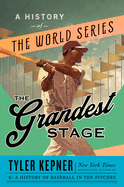
| Publisher: | Doubleday | |
| Genre: | Baseball, Sports & Recreation, History | |
| ISBN: | 9780385546256 | |
| Pub Date: | October 2022 | |
| Price: | $30 |
| Sports |
by Tyler Kepner
Born and raised in Philadelphia, national sports columnist Tyler Kepner attended his first World Series game when he was eight years old. In 1983, the Philadelphia Phillies might've caved to the Baltimore Orioles in the fifth game of the series, but young Kepner bore witness to the final out--a line drive--caught by then 23-year-old Cal Ripken Jr. of the Orioles. It would turn out to be the legendary shortstop's only appearance in a World Series over the course of his career.
That experience loads the bases for The Grandest Stage, Kepner's meticulously researched "ode to the most wonderful time of the year" in baseball. Over seven chapters, Kepner breaks down key moments from World Series history, offering insights from "those lucky enough to play or manage in the World Series or to build the teams." In 1978, clutch hitter Reggie Jackson was immortalized as "Mr. October" after he hit three home runs off three consecutive pitches from three different pitchers, sealing the first championship in 15 years for the New York Yankees. For every victory, there's an opposing loss--and heart-wrenching blunders, such as when Boss Schmidt, catcher for the Detroit Tigers, missed a curveball that should've been a game-ending strikeout. Instead, the passed ball allowed the tying run to score in a game ruled a tie after 12 innings due to darkness.
Kepner (K: A History of Baseball in Ten Pitches) hits it out of the park in delivering spellbinding historical stories in a fascinating exploration of key World Series moments for players, franchises, coaches and commentators. --Kathleen Gerard, blogger at Reading Between the Lines
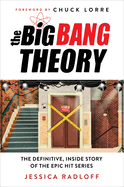
| Publisher: | Grand Central | |
| Genre: | History & Criticism, Direction & Production, Television, Genres - Comedy, Performing Arts | |
| ISBN: | 9781538708491 | |
| Pub Date: | October 2022 | |
| Price: | $30 |
| Performing Arts |
by Jessica Radloff
In The Big Bang Theory, Jessica Radloff presents a definitive and immensely entertaining oral history of the hit CBS sitcom of the same name that ran for 12 years and produced 279 episodes. Radloff conducted extensive interviews not only with the show's core seven cast members but also with notable supporting guest stars (including Bob Newhart, Wil Wheaton, Christine Baranski and Laurie Metcalf), as well as co-creator Chuck Lorre, writers, technicians and the show's resident director, Mark Cendrowski, who helmed 244 episodes. The interviews, seamlessly arranged in a chronological fashion, create a vivid portrait of a hardworking but happy set that produced a television show that was a critical and popular success.
Fans will enjoy reading about the origin of the catchphrase "bazinga!" and how quickly it was retired from use; the guest appearance by theoretical physicist Stephen Hawking; and why Johnny Galecki turned down the role of Leonard five times--"it only illustrates what an idiot I am"--before agreeing to shoot the pilot. Readers learn the reasoning behind the lack of a last name for Kaley Cuoco's character, Penny; the tense eighth-season negotiations that raised the salaries of Jim Parsons, Galecki and Cuoco to $1 million each per episode; and a whole chapter on how Galecki and Cuoco dated for two years without attracting any attention. Most of the backstage tales are hilarious, but there are also many moving memories: a good drinking game could be made with how often Galecki is brought to tears over a memory. Filled with delightful memories and charming candid photos, this is a treat for TV fans. --Kevin Howell, independent reviewer and marketing consultant
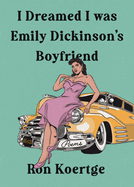
| Publisher: | Red Hen Press | |
| Genre: | American, General, Poetry | |
| ISBN: | 9781636280332 | |
| Pub Date: | October 2022 | |
| Price: | $20.95 |
| Starred | Poetry |
by Ron Koertge
Somewhere in the history of literature, the world decided that poetry was "serious." But with I Dreamed I Was Emily Dickinson's Boyfriend as evidence, poet Ron Koertge (Sex World; Now Playing: Stoner & Spaz II) asks history to reconsider. This collection of 60 poems, divided into four sections, is often funny. But the poems also raise thoughtful questions or interrogate cultural icons (as in "Mickey" or "Yahweh Barbie"), each time catching readers with surprising insight or gravity.
In "Reception to Follow," present tense establishes a sense of immediacy: "First I collect eggs for Grandma. Then I hypnotize my favorite/ Rhode Island Red." In just a few lines, the ridiculous image of a chicken driving the speaker's father's Buick bursts to life before the final stanza turns, making sense of the poem's title: "That's what I remember this afternoon standing here/ in the black suit: the look of astonishment on my father's/ handsome face."
Many of Koertge's poems sit squarely in real life, often hard and humorous. Others dabble in the absurd, casting familiar figures in unexpected roles, as in "Jane Austen at the Mall," where the celebrated author overhears an argument between "a young woman/ in Lululemon" and "a man with a big league beard," or "Death's Hankies," which asks readers to imagine "how many of them he goes/ through in a day." Detailed and full of surprises, I Dreamed I Was Emily Dickinson's Boyfriend shows what poetry can do when it doesn't take itself too seriously. --Sara Beth West, freelance reviewer and librarian
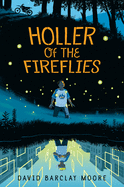
| Publisher: | Knopf Books for Young Readers | |
| Genre: | United States - African American & Black, People & Places, Social Themes, Juvenile Fiction, Prejudice & Racism | |
| ISBN: | 9781524701284 | |
| Pub Date: | September 2022 | |
| Price: | $17.99 |
| Starred | Children's & Young Adult |
by David Barclay Moore
CSK-John Steptoe Award winner David Barclay Moore (The Stars Beneath Our Feet) offers upper middle-grade readers a resonant and evocative story in his sophomore novel, Holler of the Fireflies.
Twelve-year-old Javari is excited to get away from home for the summer. The recent police killing of an unarmed Black man on Javari's block has his whole community on edge. When Javari's uncle suggests he apply to the STEM camp at Appalachian Ridge Christian College (ARCC) in Horsewhip Hollow, W.Va., the tween jumps at the opportunity to spend 14 "fun-filled days" with nothing to do but "build rockets, race boats, explore nature and learn code!" At ARCC, he chooses to study math and science in addition to coding but has difficulty meeting other kids: he is shy, short for his age and insecure about his "crossways"-staring eye. Then Javari meets a Black boy named Cricket, who is a local activist and occasional thief. The two become friends and Cricket shows Javari a different side of the holler while also introducing him to the little-known history of the ignored Affrilachians (African Americans living in Appalachia).
In this outstanding novel, Moore covers topics such as friendship, racism, poverty, class, corporate greed, the opioid crisis and social justice. His thoughtful approach to big ideas is honest and his text attends to the topics in a way that allows middle-grade readers to understand and older readers to relate to them. Holler of the Fireflies is a feel-good book that still manages to go deep into heavy topics. This profound and proficiently written novel connects Appalachia's rich and sensitive past and present. --Natasha Harris, freelance reviewer
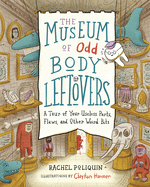
| Publisher: | Greystone Kids | |
| Genre: | Concepts, Anatomy & Physiology, Science & Nature, Biology, Body, Juvenile Nonfiction | |
| ISBN: | 9781771647458 | |
| Pub Date: | September 2022 | |
| Price: | $18.95 |
| Starred | Children's & Young Adult |
by Rachel Poliquin, illust. by Clayton Hanmer
"The useless bits. The leftovers. The bad patch jobs." These are the anatomical exhibits in Rachel Poliquin's brilliant museum for budding scientists. A wisdom tooth and a disappearing kidney guide the audience through a series of intriguingly bizarre wings within the human body, each containing some vestigial structure. The talking molar delivers fascinating background through delightfully witty dialogue, and Clayton Hanmer's illustrations ingeniously reinforce the concepts with clever detail and comic appeal. The Museum of Odd Body Leftovers is an enjoyable tour that will educate the whole family.
Poliquin, author of the Superpower Field Guide series, provides easy-to-understand explanations of evolution that accompany each exhibit. As Poliquin explains the parts of the body, she also breaks down the concepts that contribute to their demise with accessible analogies. She includes innovative sidebars and footnotes for supplemental information like pronunciations and definitions. At the end of each section, a "Love Your Leftovers" activity entices readers to try some hands-on research. Hanmer (Dog vs. Ultra Dog) perfectly complements Poliquin's humor and enhances the tour with his visual extravaganza. Wonderful small details like cobwebs and ornate picture frames add to the atmosphere; his depiction of the museum gift shop at the end of the tour is so utterly fitting and amusing it almost takes the disappointment out of reaching the conclusion.
Young readers will find myriad reasons to love learning science in this innovative presentation of the human body's transformation. And readers of any age are likely to learn a fascinating tidbit or two. The Museum of Odd Body Leftovers is the hottest ticket in town, don't miss it. --Jen Forbus, freelancer
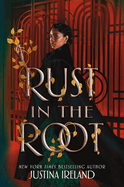
| Publisher: | Balzer + Bray | |
| Genre: | United States - African American & Black, People & Places, Fantasy, United States - 20th Century, Young Adult Fiction, Historical | |
| ISBN: | 9780063038226 | |
| Pub Date: | September 2022 | |
| Price: | $18.99 |
| Starred | Children's & Young Adult |
by Justina Ireland
In this enthralling historical fantasy by Justina Ireland (Dread Nation; Ophie's Ghosts), a young woman in 1937 New York City learns she is a powerful mage capable of defeating a god intent on destruction.
Seventeen-year-old Laura is down to her last little bit of money when she decides to join the Bureau of the Arcane, Colored Auxiliary to earn a mage's license. The Great Rust has passed and, as Americans watch Blight zones and their "troubling phenomena" appear all over the country, Prohibition blocks mages of color from practicing magic without a license. Laura, a Floramancer (magic based in the usage of seeds and pods), is hoping to become a baker. But Laura meets the Skylark, head of the Northeast branch Floramancy division, and is invited to work as the Skylark's apprentice helping to investigate a spreading Blight in Ohio. However, this is unlike any other Blight. While helping to fix it, Laura discovers she is able to use more than Floramancy. She awakens horrifying monsters who lead her to the terrifying Baldur, an ancient Norse god--and her unexpected fate.
Ireland develops a multifaceted setting by mixing historic events (real pictures included) with complex worldbuilding. Through dual points of view--Laura's genuine, lively voice and the Skylark's formal, official notes and watchful eyes--the author develops intriguing, rounded characters and shows the effects of racism and a corrupt government on them. Readers should be entranced by this alternate United States where magic and science intertwine. --Kharissa Kenner, children's librarian, Bank Street School for Children
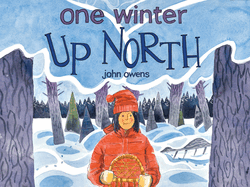
| Publisher: | University of Minnesota Press | |
| Genre: | General (see also headings under Social Themes), General, Family, Sports & Recreation, Science & Nature, Camping & Outdoor Activities, Juvenile Fiction | |
| ISBN: | 9781517912925 | |
| Pub Date: | September 2022 | |
| Price: | $17.95 |
| Children's & Young Adult |
by John Owens
Boots, hats and parkas. Sleds and snowshoes and snow angels. Condensation of the breath. The markers of the wintry cold fill the pages of John Owens's senses-stirring One Winter Up North, and yet this wordless picture book leaves readers with the impression of engulfing warmth, due to the loving family at its center.
One Winter Up North takes readers on a snowy winter camping trip enjoyed by a mom, dad and school-age child. (Readers of Owens's picture book debut, One Summer Up North, will recognize the featured interracial family.) Without the help of text to drive his narrative, Owens achieves a sort of visual poetry on every page. Snow-topped pine trees call to mind melting ice cream cones. Blue arcs in the snow resemble ocean waves in miniature. Tracks in the snow conjure necklaces, individual footprints the links in a chain. But for some readers, the book's most memorable illustration will be the one showing the interior of the tent where the family enjoys a hot meal following their outside exertions, a soothing yellow glow suffusing the scene.
Readers don't need to know that, according to an author's note, this camping trip takes place in the Boundary Waters Canoe Area Wilderness in northern Minnesota; they just need to know that, come wintertime, an animal-visited odyssey may await them outdoors, and that, for those with no opportunity for a real-life snowy adventure, One Winter Up North is a sublime surrogate. --Nell Beram, freelance writer and YA author
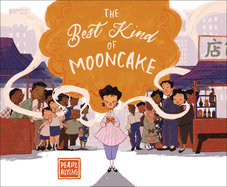
| Publisher: | Page Street Kids | |
| Genre: | Values & Virtues, Cooking & Food, Asia, Lifestyles, Social Themes, City & Town Life, Juvenile Fiction, Historical | |
| ISBN: | 9781645675563 | |
| Pub Date: | October 2022 | |
| Price: | $18.99 |
| Children's & Young Adult |
by Pearl AuYeung
A lesson in kindness shifts a child's perspective with lifelong implications in Pearl AuYeung's warm and reflective picture book debut, The Best Kind of Mooncake.
"Once upon a morning in Hong Kong, in the alley of Lee Tung Street," a listless girl passes another day at her family's store in the bustling marketplace. Today, though, a "thin, sweaty man" draws in listeners with his wailing journey of survival. The shopkeepers and hawkers turn away, bored with this familiar story--"Bah! We've all been there, brother." Later, over lunch, the child's mother notices the hungry man and prompts the girl to give him a mooncake, the very treat their mother had promised to give her and her brothers at the end of the day. Obediently but begrudgingly, the child delivers the double-yolked delicacy--"the best kind!"--and is appalled when the man "devoured the... mooncake in ONE GULP!" This act of kindness triggers an outpouring of help from other vendors, which, the girl's mother suggests, might be because "they remember that once upon a time, somebody helped them, too."
AuYeung's personal connection to this story is palpable, and an author's note explains it is based on true events in her family's past as Lee Tung Street shopkeepers. The first-person narrative is thoughtful and deliberate, and AuYeung creates through her digital illustrations an energetic, specific sense of place. The backmatter includes historical and family photographs as well as brief contextual background on Hong Kong's political history. Like a double-yolk mooncake, this tender-hearted and culturally specific nod to the golden rule should be best enjoyed by sharing. --Kit Ballenger, youth librarian, Help Your Shelf